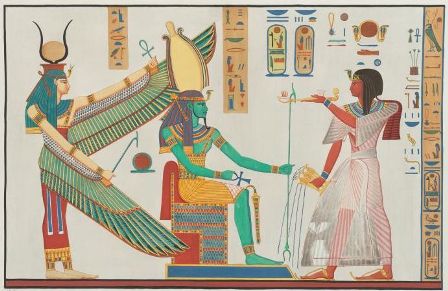Religious Beliefs
The ancient Egyptians strongly believed in God and life after death. The rule of Pharaohs was laid on the foundation of Divine Rights of Kings. The Egyptians were of the view that to please gods they should make some offerings and pray to God. Gods were worshiped in temples that were under the care of the priests who acted on behalf of the King.
 The statue of the God was placed in the heart of the temple. It was only on selected few occasions that the statue of the god was open for public worship. After the New Kingdom, the role of the King as a mediator between God and people received less emphasis. In fact, the priests created a system of revelation wherein people could directly communicate with God.
The statue of the God was placed in the heart of the temple. It was only on selected few occasions that the statue of the god was open for public worship. After the New Kingdom, the role of the King as a mediator between God and people received less emphasis. In fact, the priests created a system of revelation wherein people could directly communicate with God.
Another dominant belief was that humans are made of physical and spiritual aspects and every individual has his own shadow, soul, life force and a name. It was believed that heart was the place for emotions and thoughts. After the death of the person, the final goal of the deceased was to unite his life force and soul to be regarded as the ‘blessed dead’.
Culture of Ancient Egypt
The culture consisted of housing patterns, food, architecture, etc. The Egyptians had a staple diet of bread, beer along with vegetables like onions, garlic, fruits like date and fig.
Meat and wine were consumed by everyone in general on certain occasions while the rich had it very frequently. The social ranking of an individual was a deciding factor in the food he could consume.
The rich could afford a variety of food items while the poor were forced to stick to the normal food they could afford. Beer and Wine were customary drinks for all classes.
Honey was used instead of sugar. Butter and cheese were served at banquets held by the rich. The average people lived in mud-bricks while the rich people lived in double-thick bricks which controlled the room temperature.
Nobles living in places had huge structures and ornamented walls and floors. Construction of buildings was sanctioned and funded by the state for religious purposes. It also symbolized the reinforcing the power of the Pharaoh.
Language of Ancient Egypt
Egyptian is an Afro-Asiatic language which was spoken in Egypt till the 10th century AD. The language is associated to Berber and Semitic languages like Arabic and Hebrew. After this period, it continued to be in use as the liturgical language of the Egyptians, Christians, Copts. The Old Egyptian language was spoken for around 500 years from 2600 BC onwards.
It was the language spoken in the Old Kingdom and First Intermediate Period. Middle Egyptian was spoken for around 700 years from 2000 BC. It was often dubbed as Classical Egyptian and was known from various textual evidence. It, however, survived till some centuries AD despite the usage of the Late Egyptian language.
Latin was spoken in the middle ages. Demotic was a spoken language until the 5th century AD. Demotic language is a mixture of Egyptian script derived from northern forms of hieratic that was prevalent in the Delta and the stage of Egyptian language between Late Egyptian and preceding Coptic period. Coptic was the last language that was adopted by the ancient Egyptians.